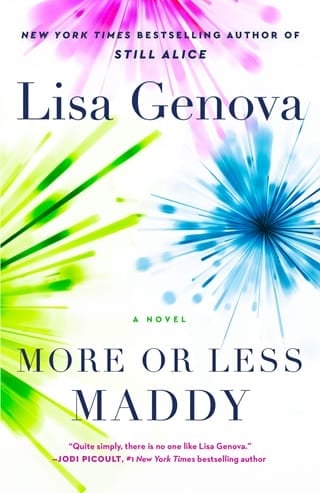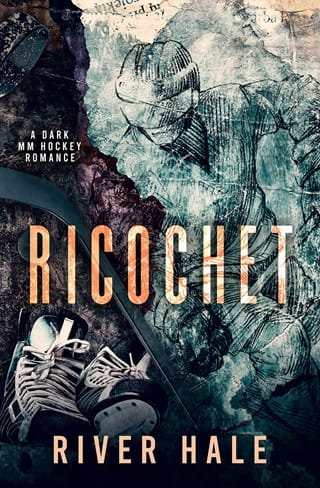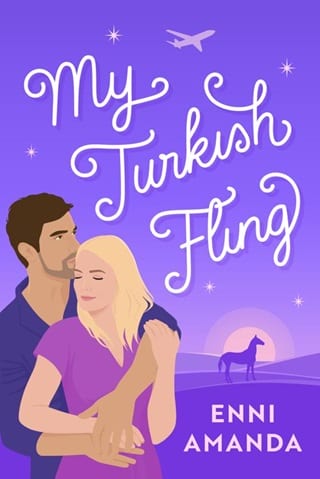Chapter 2
CHAPTER 2
Maddy paws at her nightstand without opening her eyes until her fingers find the shape of her phone. She lifts it to her face and squints at the time. 2:17.
A.m. or p.m.?
The thick navy-blue curtains drawn over blackout shades on the two windows shut out any evidence of sunlight. Her bedroom is middle-of-the-night dark, a timeless, seasonless cave perfect for sleeping, which is perfect for her because that’s all she’s wanted to do since she arrived home three days ago. She hears muffled sounds of life wafting in from the kitchen downstairs, landscaping motors growling from some neighbor’s immaculate yard.
P.m.
She begins doing math in her head, but this hurts her brain, and she gives up, tossing the effort over to her fingers. She just slept for seventeen hours. Too much and not enough.
Second-semester finals were brutal. She barely slept at all the last week of school, pulling all-nighter after all-nighter, fueled by coffee, Lemon Elation yerba mates, and an unrecommended diet of Lucky Charms, food truck waffles, and Cool Ranch Doritos. It’s no wonder she needed to crash.
Despite all that studying, she’s pretty sure she bombed her exams. She’d been an honor roll student in high school, all four years. She never got straight As like her older sister, Emily, but she didn’t try to, either. Her mother and her stepfather, Phil, had encouraged and pressured her to bump her Bs up to As. It’s a competitive world out there. You need to set yourself apart . Her mother spoke in clichés and dangled shopping incentives. She sent Maddy links to commencement speeches meant to light a fire under her butt. When cheering her on and positive reinforcement didn’t work, they tried scaring her into perfect grades, citing single-digit college acceptance rates and sharing stories of a friend’s daughter who was rejected by every school she applied to and was now addicted to drugs. But none of it convinced Maddy to do more.
She remembers studying Napoleon in tenth-grade history class. She got a B on the exam. Could she have studied harder, regurgitated more about the Battle of Austerlitz, and gotten an A? Probably. But what would’ve been the point? How is a battle between a bunch of dudes on another continent that took place over two hundred years ago in any way relevant to the modern-day life of a teenage girl in suburban Connecticut? It’s just not.
Other than for getting into college, she can’t see how anything she learned in high school mattered in any practical sense. She still doesn’t know how to change a car tire, sew a button, or cook anything more complicated than macaroni and cheese. And the Battle of Austerlitz hasn’t come up once.
Satisfied with the easily attainable, mediocre excellence of honor roll over high honors, she found everything to be easy-breezy in high school. Her first year of college at NYU was nothing but hard—the impossible-to-keep-up-with workload, living with a roommate who drove her crazy, having no clue what to major in, still not finding her passion or circle of friends, losing Adam. Twice. Her mother, Phil, Emily, her older brother Jack, and her teachers all promised college would be the best time of her life. So far, it’s been the worst. She must be doing it wrong.
Inexplicably still tired but also tired of sleeping, she stares up at the ceiling, visiting the constellation of characters she created as a child on moonlit nights, before her mother installed the blackout shades. Random cracks and divots became animals, a face with a Roman nose in profile, a gun, a girl with a wide-open mouth; a bulldog, a movie star, a serial killer, his victim. Her bedroom ceiling, a sky full of stars—funny how the brain insists on meaning when there’s nothing there at all.
The scale tips, and she gets out of bed, her entire body stiff and angry with this decision. She shuffles into the bathroom. Light from the window assaults her like a slap to the face, and she winces in physical pain. She pees with her eyes closed.
At the sink, she studies herself in the mirror—her matted, mousy-brown hair, cut in a chin-length bob; unremarkable brown eyes; bowling ball–round head that is always and embarrassingly too big for hats. Ugly nose. Too many freckles.
It’s undeniably her, but she’s detached from the reflection, spellbound by the creepy feeling that she’s caught in the gaze of a stranger, or even an animal, something not quite human. She looks into the pupils of her expressionless eyes, a bottomless muddy-brown swamp of nothingness. No shimmery sparkle, no amusement past or present skipping along a laugh line.
She leaves the bathroom without washing her hands or brushing her teeth and trudges down the hallway, the hardwood floors beneath her bare feet cool and polished to a gleaming, spotless shine. She passes the massive abstract painting, chaotic in color and composition, absurdly expensive and created by a “significant” contemporary artist, hung on the wall at the top of the stairs since Maddy was ten or so. She can’t remember what, if anything, was there before.
She used to try imagining what the artist had intended. She could detect the outline of a dog near the top right, a series of lines that could be a mountain range, the face of Hitler if she squinted. But, in truth, the piece depicts none of these things, and unable to understand what she was looking at, Maddy used to feel anxious about it. Her mother, on the other hand, loved the painting and would often pause at the top of the stairs to marvel over it. But like every other pricey precious thing in this house, its newness faded over time, and now everyone just passes by it without noticing or feeling anything.
Maddy walks down the stairs and into the kitchen on autopilot and sits in her seat at the table. Wearing tennis whites and diamond earrings heavy enough to stretch her earlobes, her mother stands at the marble island counter facing Maddy, cutting up a watermelon. Her salon-blonde hair is damp with sweat, her blue eyes underscored by thick smudges of black eyeliner.
“Good, you’re finally up. You have an appointment with Dr. Taber in an hour.”
“What? Why?”
“Your annual physical.”
Maddy groans. “I don’t want to go.”
“It’s good to get these things done when you’re home. You have a dentist appointment next week.”
“I’m tired.”
“You can’t still be tired. You’ve been in bed all day.”
“I don’t want to go to a pediatrician. I’m almost twenty.”
“You can switch to someone else next year. He’s retiring his practice in the fall anyway.”
“This is stressing me out. My head hurts.”
“You’re just hungry. Want some watermelon?”
“No.”
Her mother ignores her and places a platter of sliced watermelon on the table.
“I have sourdough. I can make you a grilled cheese.”
“I’m not hungry.”
Her mother fetches cheese and butter from the refrigerator, a loaf of sourdough from a bread basket on the counter, and a frying pan from a low cabinet.
“What are you going to do about a summer job?”
“I don’t know. Is Emily home?”
“She’s babysitting at the Rogens.”
“Where’s Jack?”
“Playing golf.”
Her mother assembles the cheese and bread on the buttered pan. Waiting, left hand on her hip, she studies Maddy. “They’re hiring waitstaff at Pine Meadows.”
Maddy rolls her eyes. “God no.”
“I saw Sofia yesterday at Starbucks. She’s a barista there.”
Sofia was her best friend from kindergarten through eighth grade. They did everything together—dance class, riding lessons, sleepovers on the weekends. They dressed in matching clothes, painted their nails the same colors, and made each other countless friendship bracelets. Her favorite had alternating pink and navy-blue clay beads surrounding MB SL 4EVA in white letter beads.
In ninth grade Maddy started seeing Adam, which naturally meant she wasn’t always available to hang out with her bestie like they used to. Maddy assumed Sofia would understand, but she was hurt and offended instead, said Maddy chose her new popular jock boyfriend over their friendship. Which she kind of had.
She’d hoped Sofia would find a boyfriend, too, so then Sofia wouldn’t depend solely on Maddy for her entire social life. And then they could also double date. But Sofia wasn’t into boys, so that didn’t happen, and she never liked Adam. They both stopped wearing their friendship bracelets, and their freshman-year rift widened into an impassable canyon by senior year.
On graduation day, Sofia’s mother asked them to stand together for a picture. Maddy remembers posing shoulder to shoulder with her former best friend on the football field, plastering a big fake smile on her face just long enough for Sofia’s mother to take the photo, feeling nothing in particular, a quick, meaningless pause before resuming the day’s celebration with Adam and her family. As she thinks about that moment now, her heart aches.
“I don’t want to work at Starbucks. I’ll see everyone.”
“So? Wouldn’t that be nice, to see people instead of sitting inside all day doing nothing?”
“Not really.”
“Well, you can’t sleep the days away and be a blob all summer.” She looks Maddy up and down. “Are you still in that same tank and sweats? Have you even showered since you’ve been home?”
Her mother transfers the grilled cheese sandwich onto a plate and walks it over to Maddy. She leans over her daughter and sniffs.
“God, Maddy, you smell like the bottom of your brother’s hamper. I’m going to shower and change. Eat and then you do the same, please. I’ll drive you to Dr. Taber.”
Her mother spins on her white tennis shoes and leaves the kitchen. Maddy pokes the crispy top of the grilled cheese with her finger. She slumps back in her chair and checks her phone.
Two unread messages from Adam.
First year of college was impossibly hard. Being back home is already harder.
 Fullepub
Fullepub 



